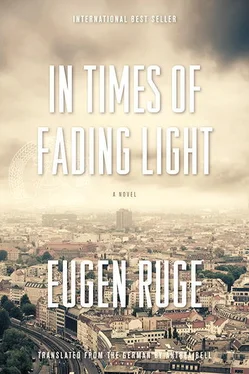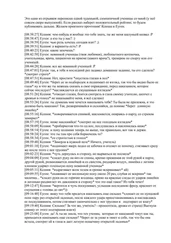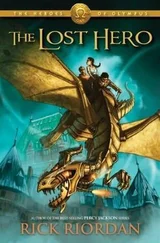Had met Marion: three years ago.
But now that didn’t seem to him like such a short time.
It occurred to him that he ought to have told her. After all, she was the only person who had visited him—although he had expressly asked her not to. And he had to admit that it hadn’t been so bad. She had not, as he’d feared, been excessively concerned for him. Had brought him not flowers but tomato salad. How did she know what he would like to eat at that moment? How did she know that he was terrified of being given flowers in hospital?
Or to put it another way: Why was he unable to love Marion? Was she too old? His own age. Was it because of the two or three little blue veins showing on her thighs? Was it something to do with him?
“My dearest, darling Irina… My sun, light of my life!”
He had never written to a woman like that. Was it just the old-fashioned thing to say, or had Kurt truly loved Irina? Had that pedantic old bastard, had Kurt Umnitzer the human machine actually managed to love someone?
The mere idea of it made Alexander feel so bad that he had to stand up.
It was just after two thirty when he went downstairs again. Kurt was still asleep. He knew that Marion was at the garden center; too early to call her, then. Instead, he called directory information. He had really meant to go straight to the airport, but now he called directory information, was given another number to call, finally got the right one, yet he still hesitated when it turned out that yes, he could book a flight for tomorrow, no problem. So long as he had a credit card.
He did.
“Well, would you like me to book it now or not?” asked the lady at the other end of the line, not discourteously but in a tone conveying that she didn’t have all day to spend on this trifling matter.
“Yes,” he said, and gave her his credit card number.
When he hung up, it was 14:46 hours. He stood in the dim light for a moment, waiting for some kind of feeling to follow—but it didn’t. All that came into his mind was a tune—one of Granny Charlotte’s ancient shellac records that had fallen on the sidewalk during their move and broken into a thousand pieces.
México lindo y querido
si muero lejos de ti…
The “hungry ’gator.” How did it go? He couldn’t remember. Could you still get a record like that in Mexico? After half a century?
He went into the “blue casket,” picked up his coffee cup, and took it to the kitchen. Stood by the kitchen window for a little while looking out at the garden. Searching, as if he owed her at least this moment of memory, for the place in the tall, golden grass where Baba Nadya used to stand for hours with her back bent, tending her cucumber bed… but he couldn’t find it. Baba Nadya was gone without a trace.
He fetched the toolbox and went into Kurt’s study.
First he took out the old chessboard that stood to Lenin’s left and folded back its flap. Opened the folder labeled PERSONAL. Took out a sheaf of papers, as many as would fit into the folding chessboard. Put them in it. Found a large, white plastic bag in the kitchen. Put the chessboard in the bag. Automatically, calmly, confidently, as if he had planned it all well in advance.
He would also put the money in the plastic bag later.
Then he unearthed the broad-bladed chisel from the toolbox—it had often been misused for such purposes before—and jammed the blade between the security lock on the door of the desk and its frame. There was a crack, wood splintered. Trickier than he had expected. He had to take all the drawers out of the other side of the space below the desk before the partition between the two halves would give way far enough for the door to open. Photographs spilled out. A pack of cards with erotic pictures. Videos. A few so-called adult magazines… and there it was, he had not been wrong: the long, red plastic box of slides. He had opened the box only once, had held the first slide that came to hand up to the light, recognized his mother, half naked, in an unambiguous pose—and put the slide back in the box in a hurry.
He fetched the laundry basket from the bathroom and placed all these things in it.
The only stove still in this house stood in the living room. It hadn’t been lit for years. Alexander found newspaper, two wooden bookends from Kurt’s Swedish wall unit—the owl-shaped bookends—and cooking oil from the kitchen. Soaked the newspaper in oil. Lit the whole thing…
Suddenly, there was Kurt in the doorway. Looking amiable and well rested. His thin little legs stuck out from his padded undershorts. His hair was all over the place, like the branches of the apple tree outside. Curious to see what he was doing, Kurt came closer.
“I’m burning your photos,” said Alexander.
“Yes,” said Kurt.
“Listen, Father. I’m going away. Do you understand? I’m going away and I don’t know how long for. Do you understand?”
“Yes,” said Kurt.
“That’s why I’m burning these. So that no one will find them here.”
Kurt didn’t seem to think there was anything unusual about that. He squatted down with Alexander beside the basket, looked into it. The fire was going well now, and Alexander began throwing the playing cards into it one by one. Then the photographs, the magazines… as for the videos, he thought, he’d put them in the garbage later, but the slides had to be burned. Only where was the box?
He looked up. Kurt was holding the box. Handed it to him.
“Well? What should I do with that?” asked Alexander.
“Yes,” said Kurt.
“Do you know what’s in there?” asked Alexander.
Kurt thought hard, rubbed his temples as he used to when he was searching for the right words. As if creating one last impulse of electrical energy in his brain by rubbing his forehead.
Then he suddenly said, “Irina.”
Alexander looked at Kurt, looked into his eyes. He had blue eyes. Bright blue. And young. Much too young for the wrinkled face.
He took the box from him, tipped the slides out. Threw them into the stove, a handful at a time. They burned silently and fast.
He dressed Kurt, combed his hair, quickly shaved the patches of stubble that the home health aide had missed. Then he made coffee (in the coffee machine for Kurt). Didn’t ask whether Kurt wanted any coffee. Then came the walk. Kurt was already hurrying to the door like a dog who knows the rules and is demanding its rights.
They went Kurt’s usual round: to the post office, as he used to say, although the way to the post office was only a fraction of Kurt’s daily constitutional, but Kurt always used to start out on his walk by saying, I’m just going to the post office —and even long after he had anything to post, he went on going to the post office. However, the presence of those twenty-seven thousand marks in the wall safe was the result of this pedantry on Kurt’s part. For a while he could still remember his PIN, so he had been able to take money out of cash machines, and having nothing else to do at the post office, he withdrew cash. Always in thousands. He once came home with eight thousand marks in his wallet. Alexander had taken the money and put it in the safe. So he was the only person who knew about it.
They went along the Fuchsbau and past the neighboring houses, whose inhabitants Alexander had once known only too well in person. This house belonged to Horst Mählich, who had believed all his life that Wilhelm was a Soviet master spy, and to the very last had defended the theory that Wilhelm had been murdered; that one was the home of Bunke, a former Stasi man who, after the fall of the Wall, spent a few more years growing vegetables in his garden, and always said a friendly “Good morning,” until he quietly disappeared; Schröter the sports teacher had lived in that house; the doctor who came from the West lived over there; and there, finally, at the end of the street was his grand parents’ house. It had already been “transferred back” to the rightful claimants, and was now the home of the grandchildren of the former owner, a middle-ranking Nazi who had made his fortune manufacturing binocular telescopes for the Wehrmacht. His heirs had renovated and repainted the house. They had restored the magnificent natural stone terrace over which Wilhelm had laid so much concrete that it collapsed. And the conservatory, reglazed and with all kinds of decorative motifs added to the windows, looked so strange that Alexander found it hard to believe he ever really used to sit there with his grandmother Charlotte, listening to her Mexican stories.
Читать дальше












